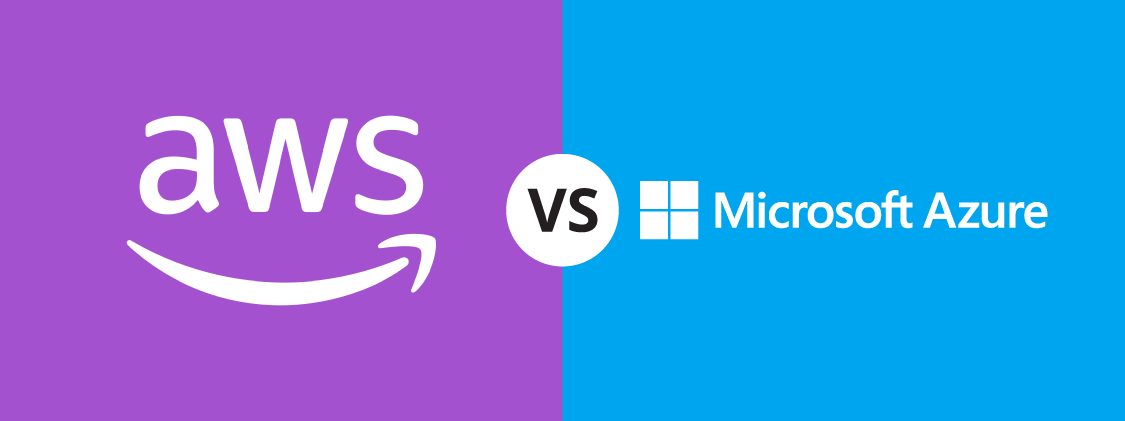AWS vs. Azure
A Comparison of Cloud Computing Environments
AWS vs. Azure… Which is better? When it comes to the cloud, Amazon Web Services and Microsoft Azure tower over the market. Although Amazon Web Services (AWS) and Azure offer similar cloud computing capabilities, one provider is not necessarily “better” than the other. Cloud customer success depends on specific business needs. To help you decide which is more amenable to your needs, we outline key differences when comparing AWS vs. Azure.
Microsoft Azure
Microsoft Azure is a set of cloud services designed to build, manage, and deploy applications on a large global network. First launched in 2010, Azure is an open source and flexible platform that supports development, service management, service hosting, and data storage. Azure is a big part of Microsoft’s business, and it competes with similar cloud services from Amazon and Google.
Market Share
11% share of the global computing market.
Pricing
Microsoft’s pricing is pay-as-you-go, charged by the minute. Azure offers short term commitments with pre-paid or monthly plans.
Compute Power
Azure users choose Virtual Hard Disk (VHD) to create a virtual machine. VHDs can be pre-configured by Microsoft, the customer or a third party. Azure users m select the number of cores and memory.
Network
Microsoft users can create isolated networks, subnets, route tables, private IP address ranges and network gateways using Virtual Network (VNET).
Long Term Data Archives
Azure does not currently offer any long term data archiving or retrieval optios.
User Experience
Azure is easy to understand for Windows administrators since it is a Windows platform. It’s relatively simple to create a hybrid environment connecting on-premises Windows servers with cloud instances. SQL Server databases and Active Directory obviously work well within Azure.
Software Licensing
With Azure, customers can use existing Windows Server and SQL Server licenses with Software Assurance to pay a reduced rate when migrating to Azure. For those using Microsoft solutions, Azure pricing models can be beneficial.
Ecosystem
With minimal Linux and open source options, Azure doesn’t’ offer a big ecosystem. Customers who already embrace Windows development tools, Azure offers native integration for them. Azure is well suite for .NET shops. Azure has been catching up with Linux over time.
Primary Advantages of Azure
Azure has deeply ingrained support for Microsoft technology stack, both current & legacy.
Microsoft supports conversion of on-prem licenses to the cloud, and is cheaper than AWs for Microsoft licensing in general.
Since it’s a smaller ecosystem, Azure is easier to understand and manage.
Pricing is granular — by the minute — so it can be cheaper.
Amazon Web Services
Amazon Web Services (AWS), a subsidiary of Amazon, is widely used secure cloud services platform, offering computing power, content delivery, database storage, and other functionality to help businesses scale and grow. AWS provides on-demand cloud computing platforms and APIs to individuals, companies, and governments, on a metered pay-as-you-go basis. Launched in 2006, AWS is by far the largest cloud computing platform, currently capturing almost one-third of the global market. AWS offers over 175 fully featured services from data centers globally.
Market Share
31% Share of the global computing market
Pricing
Amazon is pay-as-you-go, charged by the hour. Instances are paid either on demand (no upfront cost), reserved (1 or 3 years upfront), or spot (auction to use extra capacity available). On demand is most expensive and spot is least expensive.
Compute Power
AWS customers can configure their own virtual machines, deploy pre-configured Amazon Machine Images (AMIs), or create customized AMIs. AWS users select instance size, processor(s), and memory capacity. They can also select regions and availability zones.
Network
Amazon users can create isolated networks within the cloud using Virtual Private Cloud (VPC). Within a VPC, a user can create subnets, route tables, private IP address ranges, and network gateways.
Long Term Data Archives
AWS allows long term data archiving and retrieval.
User Experience
AWS Console offers power and flexibility, with numerous features and configurations – with a bit of a learning curve on how to leverage everything. AWS is widely perceived as being complicated.
Software Licensing
AWS is more expensive than Azure for Windows Server and SQL Server. For those customers heavily invested in Microsoft, the cost of software licensing should be factored into migration planning.
Ecosystem
AWS’s software marketplace features an extensive partner ecosystem. Amazon has a solid relationship with the open source community, opening up many open source integrations.
Primary Advantages of AWS
AWS has a broad & deep range of services.
A strong partner ecosystem gives more flexibility & extensibility.
For software development, AWS has outstanding DevOps support.
AWS allows long term data archiving and retrieval.


Leave A Comment